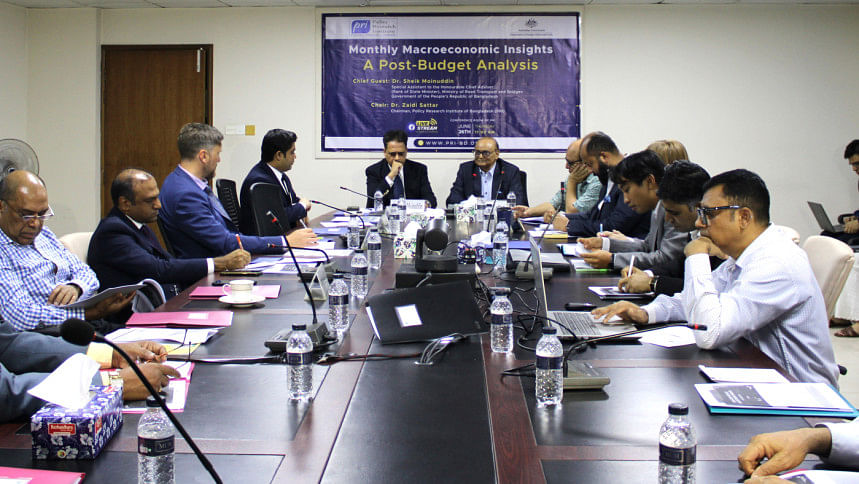Trade policy reforms needed ahead of LDC graduation: PRI

Bangladesh's budget for fiscal year 2025-26 is missing out on enabling transformative trade policy reforms amidst two looming challenges—LDC graduation and US reciprocal tariffs, Policy Research Institute (PRI) warned in a post-budget analysis today.
The institute cited the absence of "bold or transformational change" and the presence of "marginal policy tweaks" that are unlikely to drive export diversification or improve competitiveness, said Zaidi Sattar, chairman of the PRI.
According to the PRI, the FY26 budget offers only a token reduction in para-tariffs such as supplementary duties, while keeping customs duty (CD) and regulatory duty (RD) unchanged.
The clock was ticking as the country's least developed country (LDC) status graduation deadline was in November 2026, while the 90-day suspension of the Trump tariffs will expire in July, he said.
The lack of implementation of the National Tariff Policy 2023, which was designed as a preparatory step for LDC graduation, is also alarming, signalling inertia in reform, the economist said.
Presenting the paper at the PRI's office in the capital, Sattar spoke of two key external pressures heightening the urgency for reform.
Firstly, the LDC graduation will expose Bangladeshi exports to higher tariffs globally unless the country can secure preferential trade agreements, he said.
Secondly, the United States Trade Representative (USTR) has temporarily paused imposing 37 percent reciprocal tariffs on certain Bangladeshi exports, with the moratorium set to expire in July, he said.
A credible reform response aligned with the USTR requirements could preserve access to key markets, Sattar noted, urging the government to urgently redesign trade policies to meet international standards.
The PRI also criticised the revenue structure's reliance on trade taxes, which contradicts global best practices and discourages competitiveness.
While the FY26 budget aims for a 9 percent revenue–GDP ratio from the present rate of 7.4 percent, such an increase is unrealistic without broader base reforms and modernisation of the revenue administration, he said.
Reducing reliance on border taxes while expanding domestic tax bases is essential for sustaining growth, the analysis states.
Amid this grim outlook, the toy industry has emerged as a bright spot, it said.
With exports rising from $15 million in FY2017 to $77 million in FY2023, and the potential to reach nearly half a billion US dollars by 2030, it could become a flagship non-RMG export sector, it added.
However, Sattar argues that "a protective tariff regime and lack of logistics support" may stunt such sectors unless strategic trade facilitation and regulatory reforms are introduced.
With only two budgets remaining before Bangladesh graduates from LDC status, the PRI warns that policymakers must move beyond incrementalism.
The window for meaningful reform is rapidly closing. Failure to act boldly now risks long-term erosion of export competitiveness and macroeconomic resilience, he said.
"Bangladesh must embrace deep second-generation trade reforms, not only to prepare for LDC graduation but to secure its position in an increasingly competitive global trading system," he added.
Sheik Moinuddin, special assistant to the chief adviser, said Bangladesh has no comprehensive transportation-related plan that could gear up economic development.
"We need a master plan so that the multimodal transport system of the country can take our development to the next level," he said.
At present, Bangladesh's procurement process is very lengthy, project costs tend to rise, and sometimes questions arise over the necessity of some projects. The interim government is working on these, he added.
The government raised its public expenditure by over 20 percent in the last two fiscal years while the private sector is reducing its costs, said Rizwan Rahman, a former president of the Dhaka Chamber of Commerce and Industry.
The government also should think about reducing operational costs, he said, urging a focus on reducing leakages and harassment in tax collection so that people feel encouraged to pay taxes.
Ashikur Rahman, principal economist at the PRI, argued that fiscal stress has emerged as the Achilles' heel of Bangladesh's macroeconomic management.
The situation has deteriorated to the extent that the Treasury is now compelled to borrow simply to meet recurring obligations—including segments of the public sector wage bill, ballooning subsidy costs, and escalating interest payments, he said.
Compounding this crisis is a regressive and narrow tax structure that not only fails to generate adequate revenue but also entrenches inequality by placing a disproportionate burden on the lower and middle-income groups, he said.
This acute absence of fiscal space is not just a macroeconomic concern; it has paralysed the government's ability to undertake essential corrective actions—most notably, the recapitalisation of fragile banks grappling with rising non-performing loans, said Rahman.
In effect, the inability to mobilise equitable and sustainable fiscal resources is compromising financial sector stability and undermining the resilience of the broader economy, he said.
Clinton Pobke, deputy head of mission at the Australian High Commission in Bangladesh, and Ferdous Ara Begum, chief executive officer of Business Initiative Leading Development (BUILD), also spoke at the event.

 For all latest news, follow The Daily Star's Google News channel.
For all latest news, follow The Daily Star's Google News channel. 



Comments